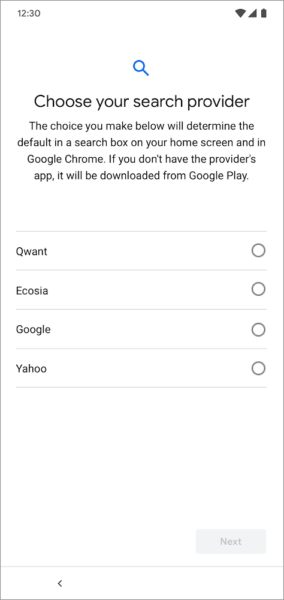Ecosia says it will boycott ‘search choice’ auction on Android in Europe
Will other European search engines also reject Google's antitrust remedy?
Berlin-based search engine Ecosia says it will not participate in Google’s “search-choice” auction for Android devices in 2020 in Europe. Will other engines follow its lead?
Search choice to start in 2020 on Android. Earlier this month, Google announced that it will introduce a new “choice screen” in Europe for Android users in 2020. The screen will appear during set up and ask users to select a default search engine.
Google plans to use an auction, as it does with comparison shopping engines in Europe, to determine which search engines to present on the choice screen. The three highest bidders will appear, along with Google, as options for users. Google anticipates search choices will vary by country, with Google always present as a choice.

Ecosia CEO Christian Kroll issued a statement this morning explaining its decision to boycott the auction process. He said, “We’re deeply disappointed that Google has decided to exploit its dominant market position in this way. Instead of giving wide and fair access, Google have chosen to give discrimination a different form and make everyone else but themselves pay, which isn’t something we can accept.”
‘Creating scarcity.’ The statement offers three reasons why Ecosia believes the auction approach is misguided:
- Ecosia believes that it is unethical for a company with a dominant market position like Google Android to discriminate access to it. Google’s attempt to auction access rights to Android is an insult to the European Commission and to the principle of equality in front of the law.
- Alternative search engines that focus on privacy or specific causes (i.e. fighting the climate crisis, to raise money for charity, or to ensure user privacy), are unlikely to be able to competitively bid in this suggested auction set-up. Profit focused partners, many of whom have access to higher monetising Google ads, automatically have better odds in this setup. This means that the competitors which are purpose-driven (and not solely profit orientated) are conveniently removed from the auction process.
- By artificially limiting user options, Google is creating scarcity where there is none. This will unnecessarily increase costs for alternative search engines, and will keep new entrants from growing market share.
Ecosia was founded in 2009 and donates most of its “surplus income” to non-profit organizations focusing on reforestation and conservationism.
Faced with immediate criticism of its announcement, Google defended the auction as “a fair and objective method to determine which search providers are included in the choice screen. It allows search providers to decide what value they place on appearing in the choice screen and to bid accordingly.”
Why we should care. Whether or not there are 4 or 14 options for users to choose from, Google would still likely retain most of its current usage in Europe, because of its brand strength versus rivals. This is the central challenge for regulators, which are trying to “unbundle” Google and Android: how to give Google’s competitors more visibility (and viability).
Comparison shopping engines have complained that the auction-based remedy used to give them more visibility in search results for the past few years has been more corrosive than beneficial.
It will be very interesting to see whether other search engines align themselves with Ecosia or decide to participate in the auction. Applications are due in mid-September. The EC still has the power to ask Google to come up with an alternative approach. And the market’s response will have a significant impact on their determination.
Contributing authors are invited to create content for Search Engine Land and are chosen for their expertise and contribution to the search community. Our contributors work under the oversight of the editorial staff and contributions are checked for quality and relevance to our readers. The opinions they express are their own.
Related stories